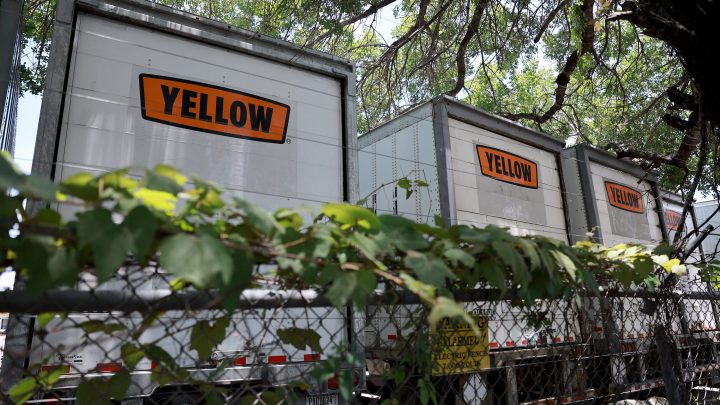
Former Yellow drivers have trouble finding jobs in right-to-work Tennessee
Former Yellow drivers have trouble finding jobs in right-to-work Tennessee

In August, one of the nation’s largest trucking companies, Nashville-based Yellow Freight, declared bankruptcy and closed its business. That left more than 30,000 people without jobs. A majority of those positions were in a union — a rarity for the trucking industry, as most freight carriers are not union shops.
And now, though they’re in high demand, some truck drivers coming from Yellow Freight are having a hard time finding work.
Tracy Cullen drove for Yellow for nearly 40 years. In the months before Yellow’s closure, he said that its relationship with the Teamsters union had already soured. The company was behind on its payments to employees’ health benefits, and after missing an extended deadline to pay up, the Teamsters union had threatened to strike.
“At the last 11th hour, lo and behold, they suddenly said, ‘OK, we’ve got the money,’” Cullen said.
But drivers like Cullen will never see the benefits the company promised. Soon after, Yellow announced it was shutting down, and in a statement, said the union was to blame. Yellow Freight did not respond to interview requests.
Now, Cullen and thousands of other truck drivers have to do something many haven’t done in a while: “Hey, start beating the street, knocking on doors, trying to get a job,” he said. “You know, and this is Tennessee. It’s going to be hard to get a union job.”
Tennessee, along with 27 other states, has right-to-work laws, which forbid mandatory union dues. Such laws can also divide a workforce between union and nonunion members, according to Dan Cornfield, an expert on unionization at Vanderbilt University.
“That takes the teeth out of the union’s capacity to strike should they reach an impasse in bargaining with the employer, because not all the workers would be expected to honor the picket line,” Cornfield said.
Theoretically, it should be easier for truck drivers to unionize, because it’s one of the few jobs in the labor sector that can’t be fully automated or outsourced right now. There’s also a shortage of drivers, which should give the ones looking for work an edge in the market.
“We would certainly invite Yellow and former drivers and other drivers to apply and seek opportunities with us,” said Anthony Norwood with Saia Freight’s Human Resources.
Norwood’s company might be willing to hire Yellow drivers, but others don’t seem so keen. That may be why some Yellow drivers are having a hard time landing new jobs, including Chris Dowdy. He thinks some companies don’t want to hire former union members like him.
“I was told by two companies — straight up by two companies — they said, ‘If you had not worked for Yellow, I would hire you tomorrow,’” Dowdy said.
Dowdy spent a month out of work, and even longer without a paycheck. He said he’s sent out dozens of applications.
“That’s the thing that has been boggling my mind, because back in the day when I came in, like when dinosaurs roamed the Earth, you were fired on Friday, you were hired on Monday,” Dowdy said.
While Dowdy was looking for work, his wife took on a second job to pay the bills.
“A lot of us guys like myself, we take pride in what we do, and we have pride in taking care of our family and making sure our family’s needs are met,” he said.
Dowdy was ultimately able to find work that was both within a union and local. He’s now driving for the grocery chain Kroger. But he said he’s one of the lucky ones; many of the drivers he worked with at Yellow are still searching for their next job.
There’s a lot happening in the world. Through it all, Marketplace is here for you.
You rely on Marketplace to break down the world’s events and tell you how it affects you in a fact-based, approachable way. We rely on your financial support to keep making that possible.
Your donation today powers the independent journalism that you rely on. For just $5/month, you can help sustain Marketplace so we can keep reporting on the things that matter to you.










